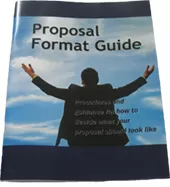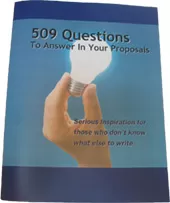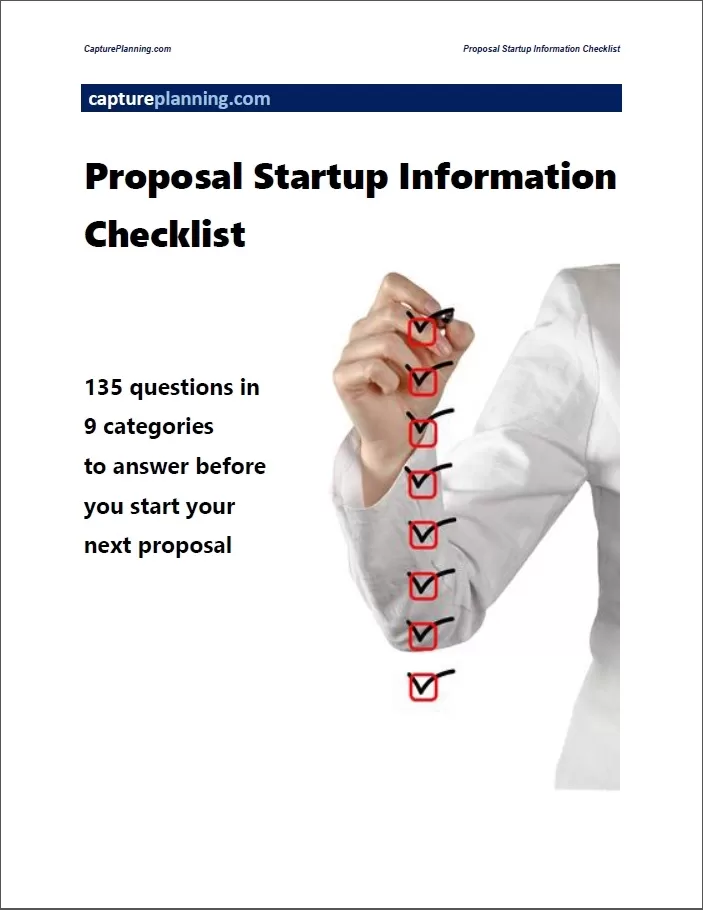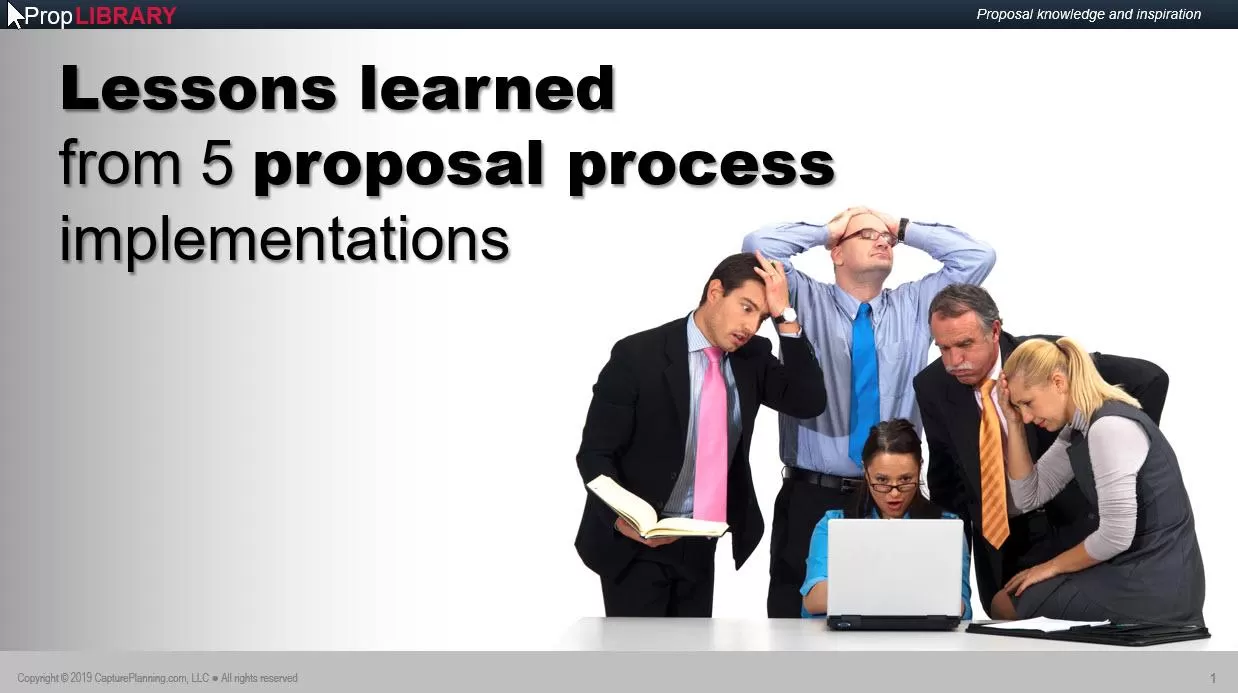Articles
-
 The most frequent question we get asked is "what should my proposal look like?" This is closely followed by "can I see a sample of a proposal?" Even though we tell people that winning proposals are built from the ground up to meet the concerns of specific customers and not by following samples, people still crave them.
The most frequent question we get asked is "what should my proposal look like?" This is closely followed by "can I see a sample of a proposal?" Even though we tell people that winning proposals are built from the ground up to meet the concerns of specific customers and not by following samples, people still crave them.- 0 comments
- 859 views
-

- 0 comments
- 1,978 views
-
 Bringing the MustWin Process online and making it much, much easier to implement We developed the CapturePlanning.com MustWin Process in 2001. It is at the heart of all the content on PropLIBRARY. The MustWin Performance Support Tool (MWPST) brings it online, but not as a process workflow tool and not as a way of automating cookie-cutter proposals. The MWPST improves the performance of the people who work on and contribute to proposals in order to maximize your win rate and ROI. The MWP
Bringing the MustWin Process online and making it much, much easier to implement We developed the CapturePlanning.com MustWin Process in 2001. It is at the heart of all the content on PropLIBRARY. The MustWin Performance Support Tool (MWPST) brings it online, but not as a process workflow tool and not as a way of automating cookie-cutter proposals. The MWPST improves the performance of the people who work on and contribute to proposals in order to maximize your win rate and ROI. The MWP- 0 comments
- 2,612 views
-

- 0 comments
- 4,430 views
-
Weekly Modules: Weekly module links are live when they are red and bold. You cannot access a module until the link to it is live. Week 1: Click here to access the Week 1 module Week 2: Click here to access the Week 2 module Week 3: Click here to access the Week 3 module Week 4: Click here to access the Week 4 module Week 5: Click here to access the Week 5 module Week 6: Click here to access the Week 6 module Week 7: Click here to access the W
- 0 comments
- 1,076 views
-
 Just like a great chef can only do so much without great ingredients, great proposal writing requires great input. A great proposal writer can’t win it for you on their own. But you don’t need a mountain of raw input. Collecting customer documents and gathering whole conversations will not necessarily do the proposal any good. In between what you’ve gathered and the proposal, you need to do an assessment. You need to turn what you have into what you should do about it and what you should sa
Just like a great chef can only do so much without great ingredients, great proposal writing requires great input. A great proposal writer can’t win it for you on their own. But you don’t need a mountain of raw input. Collecting customer documents and gathering whole conversations will not necessarily do the proposal any good. In between what you’ve gathered and the proposal, you need to do an assessment. You need to turn what you have into what you should do about it and what you should sa- 0 comments
- 3,185 views
-
 Get some serious inspiration for proposal authors at all levels. It's perfect for figuring out what to write, and for making sure you answer all of your customer's questions. We provide the questions, you supply the answers. While it may not be as sexy as a template that writes the proposal for you, it's actually one of our most useful documents. Highly recommended.
Get some serious inspiration for proposal authors at all levels. It's perfect for figuring out what to write, and for making sure you answer all of your customer's questions. We provide the questions, you supply the answers. While it may not be as sexy as a template that writes the proposal for you, it's actually one of our most useful documents. Highly recommended.- 0 comments
- 1,092 views
-
 When we created the MustWin Process, we showed you how to make the most of the time before RFP release and get into position to be ready to win. But what if you are starting at RFP release and "no bid" is not an option? We've recommended that you combine the pre-RFP questions, goals, and action items into a single list to quickly assess what you know and what you don't. Now we've done all that work for you by creating a master checklist of proposal startup information. And we've turned it int
When we created the MustWin Process, we showed you how to make the most of the time before RFP release and get into position to be ready to win. But what if you are starting at RFP release and "no bid" is not an option? We've recommended that you combine the pre-RFP questions, goals, and action items into a single list to quickly assess what you know and what you don't. Now we've done all that work for you by creating a master checklist of proposal startup information. And we've turned it int- 0 comments
- 1,317 views
-
 How do you go about influencing the customer’s RFP to give your company an advantage? When you start thinking about it and peeling back all the layers, it can seem quite complex. There's a lot to consider. And where should you start? Here is a simple formula that’s easy to memorize and can help you cover all the important aspects of the problem. Who. Who is the customer? Who is the decision maker? Who needs help? Who can make changes to the RFP? Who is playing the contracts role? Who i
How do you go about influencing the customer’s RFP to give your company an advantage? When you start thinking about it and peeling back all the layers, it can seem quite complex. There's a lot to consider. And where should you start? Here is a simple formula that’s easy to memorize and can help you cover all the important aspects of the problem. Who. Who is the customer? Who is the decision maker? Who needs help? Who can make changes to the RFP? Who is playing the contracts role? Who i- 0 comments
- 148 views
-
 Most proposal software fits one (and sometimes more) of these seven categories. Some are a better fit for winning proposals than others. Your needs depend partly on the nature of what you offer and partly on your corporate culture. It may very well be that what you need the most isn't proposal software at all... Automating proposal assembly. The only time you should automate the assembly of your proposals from reusable parts is when you sell a commodity, compete primarily on price, and
Most proposal software fits one (and sometimes more) of these seven categories. Some are a better fit for winning proposals than others. Your needs depend partly on the nature of what you offer and partly on your corporate culture. It may very well be that what you need the most isn't proposal software at all... Automating proposal assembly. The only time you should automate the assembly of your proposals from reusable parts is when you sell a commodity, compete primarily on price, and- 0 comments
- 986 views
-
 The proposal process is not about efficient repetition. It is not even primarily about managing the steps that go into creating a proposal. The proposal process is about problem solving, starting with figuring out what will it take to win. It is about solving the problems that can reduce your chances of winning. Each time you execute the proposal process you will encounter new, unanticipated problems that mostly result from the customer asking for things in different ways. This is where you shou
The proposal process is not about efficient repetition. It is not even primarily about managing the steps that go into creating a proposal. The proposal process is about problem solving, starting with figuring out what will it take to win. It is about solving the problems that can reduce your chances of winning. Each time you execute the proposal process you will encounter new, unanticipated problems that mostly result from the customer asking for things in different ways. This is where you shou- 0 comments
- 1,890 views
-
HAPD Week 2: Government RFP and Proposal Basics Overview of Week 2: This is a busy week! Monday, 1-April-2019 Module 2.1 introduces the world of federal acquisition and proposals. Emphasis will be on the Federal Acquisition Regulation (FAR), acquisition planning, requirements definition, the acquisition process, and risk. This module will be presented via web lecture and includes reading assignments with links to selected readings. This week’s quiz includes a lot of question
- 0 comments
- 72 views
-
TBD
- 0 comments
- 57 views
-
al Developer Immersive Boot Camp Home Page here
- 0 comments
- 108 views
-
Week 1: Welcome and the Basics Overview of Week 1: Monday, 25-March-2019 Module 1.1 introduces students to the Hinz Academy Proposal Developer Boot Camp course and our first assignment. Exercise 1.1 introduces students to the basics of proposal writing and live editing. Tuesday, 26-March-2019 through Thursday, 28-March-2019 Module 1.2 introduces students to content planning and live editing. Exercise 1.2 allows students to apply the content planning and l
- 0 comments
- 195 views
-
 Back in the day, the techniques below were what you had to work with. You had to be super gifted and super diligent to succeed at relationship marketing. Relationships took years to develop. If you didn’t have someone with the right skills and experience on the payroll, you relied on public announcements and databases for prospecting. It was easy to fall into low win probability habits like blind bidding. However, the old ways are no longer competitive. Relationship marketing can seem so di
Back in the day, the techniques below were what you had to work with. You had to be super gifted and super diligent to succeed at relationship marketing. Relationships took years to develop. If you didn’t have someone with the right skills and experience on the payroll, you relied on public announcements and databases for prospecting. It was easy to fall into low win probability habits like blind bidding. However, the old ways are no longer competitive. Relationship marketing can seem so di- 0 comments
- 1,451 views
-
 Some companies are built on formal hierarchies, with decisions made by someone in charge. Other companies are consensus driven and work through collaboration. Neither approach is right or wrong. Depending on the circumstances, one can be a better fit. However, picking an approach that does not match the culture of the company is doomed to failure. Rather than deliberate over how to determine which approach will work in a given environment, there is a much simpler approach. If you have to as
Some companies are built on formal hierarchies, with decisions made by someone in charge. Other companies are consensus driven and work through collaboration. Neither approach is right or wrong. Depending on the circumstances, one can be a better fit. However, picking an approach that does not match the culture of the company is doomed to failure. Rather than deliberate over how to determine which approach will work in a given environment, there is a much simpler approach. If you have to as- 0 comments
- 1,639 views
-
 monthly_2025_08/LessonsLearnedfrom5proposalprocessimplementa.mp4.bbea1f757b3ad500576fb541e01e62ac.mp4
monthly_2025_08/LessonsLearnedfrom5proposalprocessimplementa.mp4.bbea1f757b3ad500576fb541e01e62ac.mp4- 0 comments
- 1,079 views
-
Week 1 Discussion For the Week 1 discussion, complete your initial post by Tuesday at 11:59 PM ET and respond to a minimum of two posts by Thursday at 11:59 PM ET. This week’s discussion: Introduce yourself and your interest in the proposal profession. Respond using an outline format that you create based upon these instructions. Include: 1. Your name 2. Where you grew up 3. What was your favorite course in school and why? 4. Do you enjoy wri
- 0 comments
- 91 views
-
For the Week 1 discussion, complete your initial post by Tuesday at 11:59 PM ET and respond to a minimum of two posts by Thursday at 11:59 PM ET. This week’s discussion: Introduce yourself and your interest in the proposal profession. Respond using an outline format that you create based upon these instructions. Include: 1. Your name 2. Where you grew up 3. What was your favorite course in school and why? 4. Do you enjoy writing and project manage
- 0 comments
- 54 views

